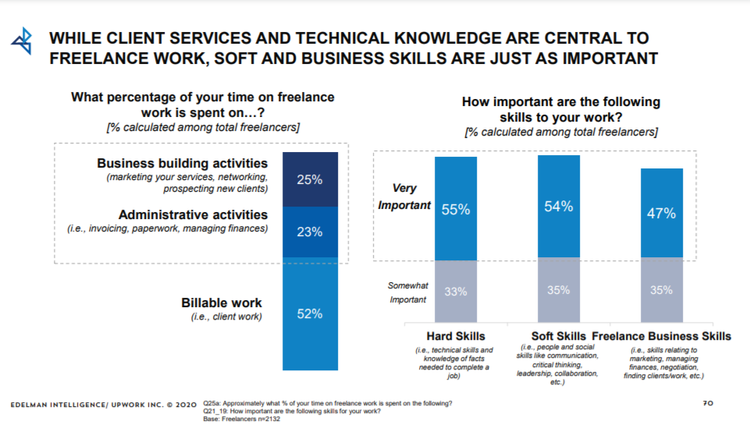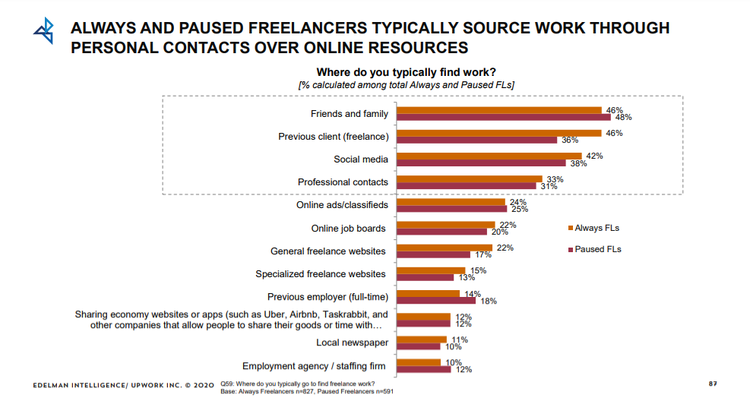How to Market Your Skills as a Freelancer
Marketing for freelancers is challenging because it’s a special skill set you may not be familiar with. Even if you’ve done marketing before, self-promotion can feel awkward. But selling your services equals income, so it’s a necessity for freelancers.
Plus, as more people turn to freelance work, solo entrepreneurs need to market themselves to stay competitive. Upwork’s Freelance Forward 2020 report found that, “36% of American workers freelance,” and 65% earn more freelancing than through employment, making it a lucrative career decision.
Fortunately, you can get started as a freelancer without spending a dime. However, you will need to put in time reaching ideal clients and helping them find you. Boost your income and turn your freelancing gigs into a successful small business using marketing tactics proven to get results.
The importance of marketing your skills when you are a freelancer
Whether you’re a full-time or part-time freelancer, once you join the ranks of independent workers, you’re in charge of a small company, and its success depends on marketing your skills.
Learning how to market yourself requires a combination of self-promotion, outreach, and market research. Each aspect helps you:
- Differentiate yourself from other freelancers.
- Highlight your portfolio on a developer or artist’s website.
- Compile a list of potential clients who are a good fit for your services.
- Create and maintain an online presence that showcases your skills.
- Secure ongoing work suited to your passions and income needs.
- Reduce the probability of attracting undesirable clients.
- Build your network and increase word-of-mouth referrals.
- Position yourself as an expert and thought leader in your industry.
Few freelancers start with a flood of clients requesting services. And freelancing during COVID-19 comes with unique challenges. Once you get over the hurdle of self-promotion, you’ll find the process gets easier, feels more natural, and it turns into a familiar business task you complete weekly or monthly.
Explore ways to boost your freelance business skills using tactics for marketing, networking, and prospecting.

Freelancers spent 25% of their time marketing, networking, and prospecting. Image source: Author
6 tips to market yourself as a freelancer
Set your freelance life up for success by approaching marketing with your small business hat on. Research your target market, make a plan, and use these tips to develop an ongoing sales and marketing strategy.
1. Organize your marketing approach
When you’re first starting out as a freelancer, it’s easy to keep up with your marketing activities. But once you get busy, it’s often the first thing that gets set aside. Use free project management (PM) software, like Trello or Airtable, to:
- List profiles that need regular updates, from social channels to freelance work platforms.
- Track pitches to potential clients and save conversations for future reference.
- Create swipe files with screenshots and links to examples of marketing in your industry.
- Develop keyword lists, niche sources to refer to, and existing industry contacts.
2. Optimize your freelance platform profiles
Nearly all freelancers initially set up profiles on various platforms, like Upwork, Fiverr, or ClearVoice. But when time is short, you may be tempted to only fill out the necessary fields or forget to regularly update your profiles.
Head back to each channel, complete every field, add portfolio work, link to your social media accounts, and a natural-sounding yet keyword-rich bio will result.
Next, set up reminders in your PM software so you remember to come back and update each profile at least once a month. Much like social media or search engines, freelance platforms tend to reward active users. Even if you haven’t worked on the site yet, it’s essential to add new content to your portfolio and update your bio to keep your profile visible.
3. Leverage LinkedIn for marketing
LinkedIn is a critical channel for freelancers, with the online platform reporting more than 20,000 U.S. businesses use the platform to recruit, and “over three million jobs are posted on LinkedIn in the U.S. every month … .”
Get the most out of LinkedIn by:
- Completing your profile: Write a value-filled summary using industry and skill-related keywords. Don’t forget a professional yet compelling headline.
- Optimizing job descriptions: Flesh out your experience by turning job duties into accomplishments reflecting how your work benefited a previous employer or client.
- Adding skills and endorsements: Look at job ads to see skill keywords used in your industry, then choose from more than 50,000 skills to add to your profile.
- Securing recommendations: Reach out to your network and request a LinkedIn recommendation.
- Actively using the platform: The more you use the platform, the more views your profile gets. Set aside 10 minutes daily to like and comment on posts.
4. Build a website or portfolio site
While you can find jobs or show proof using profiles on freelance marketplaces, you ultimately want to direct leads to a website or portfolio you own. Plenty of website builders exist to get a site up and running, including Squarespace and Wix.
Once you decide on a platform, use your swipe file to get ideas from your industry experts. Look at how each freelancer sets up site navigation, organizes about me or bio pages, and displays their portfolio. Use a free tool like Ubersuggest to identify keywords on sites you want to emulate.
Like everything else in marketing, updating is critical, so add this task to your project management board.
5. Send letters of intent
Marketing for freelancers includes pitching your services, and it’s probably the least favorite task for some entrepreneurs. However, reaching out to potential clients and introducing yourself is one of the top ways to secure new work. Do your research, find the person who hires freelancers, and send them a personal email.
- Start with a short line mentioning how you know the person or compliment them on a recent award, viral tweet, or brand accomplishment.
- Give an elevator pitch describing what services you provide and any well-known brands you’ve worked with.
- Identify how you solve your recipient’s problem (the reason they hire freelancers) and what you promise to deliver.
- Provide proof, such as links to recent projects.
- End with a call to action, encouraging the prospect to schedule a phone call or email you back.
It can be tough to condense everything you want to say into a few lines. However, no one wants to read a book in an introductory email. Perfect your letters of introduction by gathering examples, asking for advice in community groups, or enlisting help from a marketing or writing mentor.
Lastly, keep in mind that your letter of introduction isn’t just for unknown clients. You can use your elevator pitch when you meet someone in person or when reaching out to professional contacts.

Most freelancers find work via friends, family, previous clients, social media, and professional contacts. Image source: Author
6. Get active on social media
While activity on Facebook or Twitter may not result in instant lead generation, both channels are fabulous tools for networking and building social proof. Switch your personal account to a business account, fill out your profile, and get involved.
Beyond posting on social media, you can:
- Participate in Twitter chats: Search Twubs or TweetReports to find industry or skill-specific chats to learn, grow, and share expertise.
- Join Facebook groups: Participate in communities to network, get answers from other professionals, and learn about potential freelance gigs.
- Take part in LinkedIn groups: Select groups where your clients hang out to stay up on industry news and network with potential customers.
Things to avoid when marketing yourself
Whether you’re marketing online or networking in person, you’ll close more deals with professional communications and a consistent approach. Put people and results first for the best outcomes.
Don’t waste people’s time
You want every experience to be professional and seamless, meaning you make it easy for prospective clients to contact you and you check every communication for tone and grammar. Avoid sending out spammy messages on social media or generic emails.
Don’t list skills like it’s a fast-food menu
Forget old resume styles listing a bunch of generic skills. Instead, show your prospects how you can fix their problems and provide examples of outcomes. After all, the point of marketing is to sell the result and offer proof of your expertise.
Marketing for freelancers: Next steps
Freelancing is a lucrative way to work independently and achieve financial stability during uncertain economic times. So what are you waiting for? Start networking, market your skills, and build an income stream that will turn your freelancing efforts into a profitable small business.
Alert: our top-rated cash back card now has 0% intro APR until 2025
This credit card is not just good – it’s so exceptional that our experts use it personally. It features a lengthy 0% intro APR period, a cash back rate of up to 5%, and all somehow for no annual fee! Click here to read our full review for free and apply in just 2 minutes.
Our Research Expert
We're firm believers in the Golden Rule, which is why editorial opinions are ours alone and have not been previously reviewed, approved, or endorsed by included advertisers. The Ascent, a Motley Fool service, does not cover all offers on the market. The Ascent has a dedicated team of editors and analysts focused on personal finance, and they follow the same set of publishing standards and editorial integrity while maintaining professional separation from the analysts and editors on other Motley Fool brands.
Related Articles
View All Articles